
The police have charged Nicholas Morris with the murder of David Pacheco, the 2-year-old Bronx boy shot to death in his family car on the way to Easter dinner. But speaking during his meeting with 14 other mayors on guns in April, Mayor Michael Bloomberg cited another culprit: Congress.
|
Related Articles: |
"The only thing that would have helped that child is if we had the courage to stand up and get the guns off the street," Bloomberg said. "The number of people in Washington who are deliberately voting to permit guns to go to the hands of criminals is really worrisome."
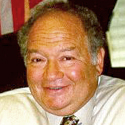 Gary Ackerman |
New York City politicians and law enforcement official often complain that, despite tough state and local gun laws, firearms remain readily available on the streets of New York City because of Congress’ opposition to gun control. But it isn’t only guns. The actions of the U.S. Congress affect New Yorkers in hundreds of ways, from student standardized test scores to the war in Iraq, where 35 New York City residents have lost their lives.
The 435 member House of Representatives includes 13 representatives from New York City, 12 of them Democrats. All House members are up for re-election this year. One, Major Owens in Brooklyn, has announced he will not seek re-election prompting five Democrats, including his son, two City Council members and two members of the State Legislature, to try to replace him (see related story).
Next door to Owens’ district, longtime incumbent Edolphus Towns is facing three challengers (see related story).
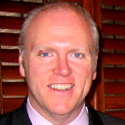 Joseph Crowley |
But New York’s other House members seem to have reaped the big blessing of incumbency – little serious opposition. While candidates have until July 13 to file for the September 12 primary, most express their intentions much earlier. And so far, there do not seem to be many viable candidates out there. According to Federal Election Commission records, K.T. MacFarland has raised money in the 14th Congressional District, but the Republican now seems inclined to forego a challenge to incumbent Representative Carolyn Maloney in Manhattan’s Silk Stocking District and run against Senator Hillary Rodham Clinton instead.
Despite the apparent paucity of exciting races here, the fall’s congressional contests could make a big difference for New York City. If Democrats gain control of the House, the New York delegation, for better or worse, could hold more power in Congress than it has since 1994 when the Republicans, led by Newt Gingrich, took control of the House.
WHAT BLOOMBERG WANTS FROM CONGRESS
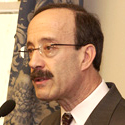 Eliot Engel |
Despite the decline of the kind of urban agenda that played a key role in national politics in the 1960s and into the 1970s, Congress matters. No one seems to know this better than Bloomberg. Since his re-election in November, he has been increasingly outspoken on national issues. New York represents a big source of campaign money for candidates from both parties, so Bloomberg wants the city’s donors to put their mouths where their money is and make sure candidates for national and state office promise to pursue New York City’s interests. A crib sheet the mayor has distributed lists five litmus tests, four of them at least partly Congress’ responsibility:
Transportation: Use tax credits that were part of Washington’s aid package to New York after 9/11 to build a rail link from lower Manhattan to Kennedy Airport;
Security: Distribution of homeland security funds to state and local governments, based on the level of threat facing the city or state;
Development: Opposition to federal eminent domain legislation that would restrict the use of this power and, in Bloomberg’s words, “cripple responsible redevelopment and revitalization”;
 Vito Fossella |
Housing: Support for financial incentives for affordable housing.
WHAT WASHINGTON CAN DO
And Bloomberg is not the only one with a list of demands for Congress. Other groups and individual have their own ideas about what Congress can do for them. A few examples:
Health Care
About $1.8 million New Yorkers do not have health insurance. “The biggest issue we face as New Yorkers is access to affordable health care,” Bloomberg said last fall. Many observers do not expect that to change significantly until the House and Senate enact some kind of national health plan.
 Carolyn Maloney |
Housing
The New York City Housing Authority recently announced it plans to raise fees and rents for some public housing tenants. The public housing authority said that it faces a budget shortfall because, while energy and pension costs continue to rise, the federal government has cut funds to help house low-income New Yorkers. If Congress appropriated more money for housing, the city could keep rents down or provide more services to public housing residents.
Immigration
An estimated 652,000 illegal immigrants live in New York City, and more than a third of New Yorkers were born outside the United States. The House of Representatives has passed a very tough bill, which sets criminal penalties for illegal immigrants and people who help them and tightens border security. The Senate is currently debating immigration. Any bill it passes would have to be reconciled with the House version. The outcome of this debate could determine whether thousands of New Yorkers can remain in the country legally or be forced to leave.
 Gregory Meeks |
Transportation
After decades on many New Yorkers’ wish lists, the Second Avenue subway could finally become a reality. One reason for this is that Congress appropriated money for the new East Side line and other transit projects in a major transportation bill passed last year.
Sometimes congressional involvement in New York can seem almost petty. In 1986, for example, Congress, at the behest of then Congressmember Guy Molinari, decided to charge only a one-way toll (into Staten Island) on the Verrazano Narrows Bridge. Critics charge that this has increased congestion, caused accidents and costs the Metropolitan Transportation Authority some $10 million a year. Despite that, the toll cannot be charged in both directions without an act of Congress.
THE POWER OF THE PURSE
Congress controls billions of dollars that affect New York – and they do not always spend it to the city’s advantage. Bloomberg has said the city sends $13 billion more in taxes to Washington than it gets back in spending. And next year's budget, proposed by President George W. Bush and now being considered by Congress, could make that imbalance worse.
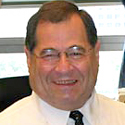 Jerrold Nadler |
According to an analysis by State Comptroller Alan Hevesi, the proposed federal budget, released in February, could cause the state to “lose billions in federal funding associated with reductions in Medicaid and Medicare, education, transportation and labor spending.” While Bloomberg asked Washington for $100 million more this year, the proposed budget cuts funds to the city by $1.35 billion, says a report by Representative Anthony Weiner, a Democrat.
The cuts cited by Weiner include a $32 million cut in the $203 million for homeland security the city gets from Washington and $84 million less for Medicaid and Medicare. “It is a budget that cuts the Big Apple to the core,” Weiner has said.
The budget currently is in Congress where some conservative Republicans are calling for more cuts in social programs that normally help cities. Before the budget can become reality, both the Senate and House must reconcile any differences between them and pass a budget that President Bush will sign.
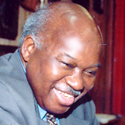 Major Owens |
Of course Congress’ effects on New Yorkers extends beyond specific budget lines or programs directed at the city. As Americans, residents of the city are affected by laws passed by Congress. And so, when Congress bars discrimination, New Yorkers are among those it protects. When it calls for schools to test more, city students must fill in their bubble sheets. When it slashes taxes, some New Yorkers get to keep more money. And when Congress agrees to the war in Iraq, New Yorkers are among those who fight it.
THE NEW YORK DELEGATION
To represent New York’s interests, the state has, like every other state, two senators. It also has 29 members of the House of Representatives. Thirteen of them are all or partly from New York City. The only Republic among those 13 is Vito Fosella of Staten Island.
Many, though not all, of the Democrats are at the left end of their party. Gary Ackerman, for example, has a 95 percent rating from the liberal Americans for Democratic Action and a 4 percent from the American Conservative Union, while Jerrold Nadler and Jose Serrano are among the most liberal members of the House,” according to the Almanac of American Politics. In 2002, seven of New York City’s representatives were among the 156 members of the House who voted against the war in Iraq.
As the country has become increasingly Republican, the New York delegation has become more Democratic. Since Charles Schumer defeated Republican Alfonse D’Amato in 1998, both the state’s senators have been Democrats. Of its 29 representatives, 19 are Democrats.
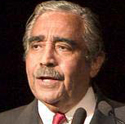 Charles Rangel |
Although the senators are in the minority party, both of them hold a high profile. Schumer is the top – or, in Washington parlance, ranking -- Democrat on the judiciary committee, playing a key role in confirmation battles over judges. He also chairs the Democratic Senatorial Campaign Committee, which is spearheading efforts to win a Democratic majority in the Senate. And Clinton, who is up for re-election this year, is, of course, a likely presidential candidate.
But the representatives seem to have a tougher time on conservative Republican capital hill. “Except for Fossella, they are all Democrats in a Republican Congress so there is a limit to their effectiveness,” said Josh Kurz, political editor of the Capitol Hill newspaper Roll Call.
“They’re doing about as well as could be expected,” said Marie Horrigan, political reporter for Congressional Quarterly. She added that some of the New Yorkers, such as Carolyn Maloney, have focused on promoting liberal issues, which are difficult to advance in this Congress.
The state has also lost clout in terms of numbers. In 1960, New York had 43 representatives in the House, by far the largest number in Congress. Today it has the third largest – behind California and Texas – and it will probably lose more seats after the 2010 census.
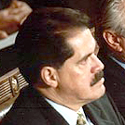 Jose Serrano |
The state’s fractured politics also take their toll. Representatives from some other big states typically meet together to set legislative priorities. But, the Buffalo News observed last year, “New York’s congressional delegation doesn’t work that way, mostly because of the New York City-upstate split in needs and interests.”
No member from New York City chairs a committee – because that role always goes to a member of the majority party. Fossella, elected in 1997, has little seniority, so does not chair any committees. Earlier this year, Joseph Crowley tried to become vice chair of the House Democratic caucus. Although insiders saw his as the frontrunner, he lost out to John Larson of Connecticut. Despite that, Kurz said, Crowley “is seen as a potential player in the future.”
An admittedly subjective review of the delegation, done in 2003 by the now seemingly defunct PoliticsNY web site gave New York’s representatives mixed marks. Jerrold Nadler (“one of the smartest liberals in Congress”) and Anthony Weiner (“among the best the Empire State sends to Congress”) scored highest. Major Owens (“doesn’t have much to say about what’s going on in Congress”) and Ed Towns (“the lowest profile member of the New York congressional delegation”) were at the bottom of the list.
 Edolphus Towns |
The most prominent member of the delegation – and the longest serving – is Harlem’s Charles Rangel. He was first elected in 1970 and now serves as the ranking Democrat on the House Ways and Means committee. The New York delegation can be divided into two groups, said Kurz: “There’s Charlie Rangel and there’s everybody else.” Even as a member of the minority he manages to have influence. “He’s well known, well-respected, bombastic, and he gets on TV,” Kurz said.
LOOKING TO NOVEMBER
Even though he is currently not facing any serious opposition, Rangel has a lot at stake in November’s elections. If the House switches to the Democrats – a shift of 15 seats from the Republican to the Democratic column would accomplish that – Rangel would become chair of the committee. Becoming chair “would be the brass ring,” Rangel told the New York Observer. It would also give him a lot of say over policy on welfare, Medicaid and Medicare, issues of obvious concern to many of his Harlem constituents and other New Yorkers.
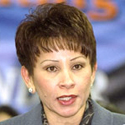 Nydia Velazquez |
If the Democrats do not win the House – and Rangel his leadership post – the congressman has indicated he might retire. That, some think, would further erode the city’s power in Congress. “There is only one Charles Rangel and when he leaves, there is going to be a power vacuum,” his colleague, Gregory Meeks of Queens has said.
New York State could help determine whether Rangel gets the “brass ring” or becomes a private citizen. Optimistic Democrats have said about a half dozen Republicans House seat in the state are “in play’’ – meaning they think they have a crack at them. Outside observers see a lower number, but think New York could see one or two seats switch from Republican to Democratic hands.
For now, though, it appears the GOP will keep its one seat in the city. Democrats had considered mounting a vigorous challenge to Fossella, but three city council members all declined to take on the race. His remaining opponent is Bay Ridge lawyer Stephen Harrison. The race is “very hard for a Brooklyn Democrat, even for someone from Bay Ridge or Dyker Heights," political consultant Hank Sheinkopf told the Daily News. "It would be very difficult for a Democrat to win”
 Anthony Weiner |
The other New York City seats are, by and large, “safe,” according to the Almanac of American Politics. The people holding them – many of whom have been in Congress for more than a decade-- think the city would fare better in a Democratic House of Representative than in the current Republican one. And so New York’s fortunes in the next Congress may depend far more on what happens in suburban Denver, eastern Iowa and Chillicothe, Ohio, than the politicking on the city’s own sidewalks.
Â




